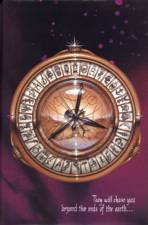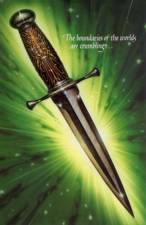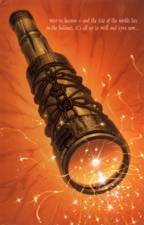

| Click on a book's image or title to order from Amazon.com |

Northern Lights
Scholastic Press, HC, © 1995, 399 pp, ISBN #0-590-54178-1(Published in the US as The Golden Compass)
Reviewed January 2001
Northern Lights is the first volume of Pullman's trilogy His Dark Materials. Sometimes compared to J. K. Rowling's Happy Potter series as a contemporary children's fantasy series, this book is very different from Rowling's works. Ostensibly written for older children, it's much more sophisticated and better-written than Rowling's books, although its sense of wonder is more subdued. Overall, the two series are so different from each other that direct comparison is nearly impossible.
Northern Lights "is set in a universe like ours, but different in many ways." And is it ever! Lyra Belacqua is a girl in the care of the scholars at Jordan College at Oxford University in England. Apparently in the present day, Lyra's world is very different from our own: All humans have "daemon" companions - small animals who in a sense represent their souls - and magic is common, although not necessarily ostentatious. Perhaps 10 or 11 years old, Lyra has been educated haphazardly and prefers to play with other children on the campus and town.
One day she learns that her uncle, Lord Asriel, is embarking on a mission to the north, to investigate the phenomenon of "Dust" which comes from the sky, and the mysterious city he saw in the northern aurora. Meanwhile, mysterious people called Gobblers have been stealing children from across England for unknown purposes. Soon after Asriel leaves, Lyra is given into the care of one Mrs. Coulter; the Master of Jordan college seems to do this unwillingly, and in doing so secretly gives Lyra an Alethiometer, which when properly read can divine information about the present and future.
Lyra soon learns that Mrs. Coulter is somehow involved with the Gobblers, and that the children are being taken north for some sort of sacrifice. She escapes from them and falls in with a band of gyptians (presumably gypsies, though the ambiguous name could also imply egyptians) who mount an expedition north to rescue the children. Along the way they enlist the aid of an air balloonist and an armoured bear named Iorek Byrnison, and Lyra discovers the aims of the Gobblers, and learns what Lord Asriel has been doing in the north.
Although the end of the book clearly paves the way for the next installment, Northern Lights is still a pretty satisfying story on its own. Pullman's constructed world is hauntingly familiar for all its differences, and the fantastic elements it make the world more colorful without seeming extravagant.
Indeed, the world is one of the most compelling reasons to read this book: Iorek Byrnison and the culture of the armored bears. The caring-yet-assertive nature of the gyptians. The hints of major cultures in the world which are either no longer factors in our world, or go by different names. The magic of the Alethiometer. The connection humans have with their daemons. It's often presented perfectly matter-of-factly (albeit sometimes filtered through Lyra's eyes; she takes daemons in stride but is awed by Iorek Byrnison), and Pullman expertly avoids the fantasy cliche of sacred rules and convenants which govern how magic and exotic beings behave (the bears have their peculiar sense of honor, but also have their own brand of free will, and are not bound by artificial rules).
Lyra holds an interesting position as the central character, in that occasionally the book will cut away from her to other people talking about her, referring to a grand destiny she has, but that she cannot be aware of this destiny or it won't unfold as it should. It's not clear by the end of the book exactly what she's supposed to do and why she can't know it, but it's a very provocative device. And she's certainly the main driving force throughout much of the book, being strong-willed, loyal, and crafty in her way.
The story's tone is mostly a dark one. One often feels that the book mostly takes place at night, underscored by the exotic locales much of it occurs in. It's Lyra's exuberance that prevents this from feeling oppressive, and her familiarity with the world that keeps us from feeling lost in it. The dark mood is mostly atmosphere, however; the book isn't particularly a tragedy (and, as I've said, it leaves much left undone to be picked up in future books), which is a welcome thing.
I look forward to reading the remainder of the trilogy to see how it all works out.
(Addendum: I've heard that His Dark Materials is to some degree based on or influenced by Milton's Paradise Lost, but I'm insufficiently knowledgeable to perceive the similarities. Others may find the book more or less rewarding knowing that, however.)

The Subtle Knife
Scholastic Press, HC, © 1997, 341 pp, ISBN #0-590-54243-5Reviewed March 2001
If you felt slightly dissatisfied at the end of Northern Lights, then let me encourage you to continue on to read its sequel, The Subtle Knife, which is a superior book in nearly every way.
Knife adds a second protagonist, 12-year-old Will, from our own Earth. His father disappeared on an expedition to the Arctic when he was an infant, and he's been protecting his eccentric mother ever since. Now he has to put his mother in the care of a friend and escape from some men trying to find his father. In doing so, he stumbles into a parallel world - a third one different from ours and from Lyra's. Here, strange Spectres have spread out across the land, sucking the liveliness from any adults they can catch, although children are immune, and can't even sense their presence! As a result, Will is exploring an abandoned city when he meets Lyra, who has also ended up in this strange world of Cittagazze.
Lyra has become separated from her father, Lord Asriel, and is still investigating the nature of Dust. On our world, she meets Dr. Mary Malone, who's investigating Dark Matter, and who reveals fascinating new things to Lyra. Alas, along the way she meets a treacherous man who blackmails her and Will into capturing the Subtle Knife from its wielder on Cittagazze, which unlocks the nature of Lyra and Will's destinies and reveals what Lord Asriel is up to.
Which is not to say that all is revealed, as this is the second book in a trilogy. But answers start coming at last, tying several elements together (Dust, Shadows, daemons, the Alethiometer, and the holes between worlds) and being generally quite satisfying.
Lyra and Will are the book's greatest strengths, as they each have their own missions to perform and their own ways of going about them, plus their interactions as they gradually get to know each other. Both begin their stories as young, fairly desperate people: Lyra having been torn out of her safe world at Jordan College, and Will having never really had a measure of true safety, and this colors the nature of their actions and reactions. (One frustrating element of this is that Lyra starts taking a subservient role to Will, explicitly deciding to go along with what he wants for certain reasons, which makes it feel less like her story.) They feel like real people, and for the most part even like children despite the situations they're thrown into.
And the plot drives along much more speedily than did Northern Lights, as there's less to learn about Cittagazze than there was about Lyra's world, so more time can be spent on the machinations and movements of various people (old friend Lee Scoresby, old adversary Mrs. Coulter) and the revelations of how the pieces fit together. Pullman allows us (and Will and Lyra) the leisure of exploring Cittagazze for the early part of the book before drawing in other elements which force them to choose new paths which take them away from their early refuge. And through the self-contained adventures of the individual chapters, moves everything to a precipitous point by the end of the book, although one which makes you say "What next?" rather than "What's going on?"
And Pullman's writing is as evocative and intricate as in the previous book, and again walks that fine line between children's and adult literature. Again, I doubt this book would appeal to children younger than the oldest pre-teens, but certainly any child up to reading The Lord of the Rings should find this an appetizing series.
There's still a lot of story to go (the third book, The Amber Spyglass, is the longest of the three volumes by far), but I'm eagerly looking forward to how ot all turns out.

The Amber Spyglass
Scholastic Press, HC, © 2000, 548 pp, ISBN #0-590-54244-3Reviewed March 2001
The epic conclusion to Pullman's His Dark Materials trilogy does not disappoint. It picks up right where The Subtle Knife left off: As Lord Asriel's army against The Authority gathers, Will searches for Lyra. He finds himself in Lyra's world, and finds unusual allies in a pair of renegade angels, and the armored bear Iorek Byrnison. Meanwhile, Dr. Mary Malone from our world ends up on a third world where she's befriended by creatures who use giant seed-pods for wheels. While there she makes several discoveries about the behavior of Dust.
The centerpiece of the story involves Will and Lyra embarking on a trip to the land of the dead, followed by two small Gallivespians, potent spies in the service of Lord Asriel trying to persuade the children to join his cause. But Lyra has a mission which Will determines to assist her with, and it proves to be their greatest test as they're forced to give up one of the things most dear to them.
But the overall direction of the book is to determine the outcome of the great war between Asriel's forces and the Authority's, the importance of Dust, and how Will and Lyra fit into the grand scheme of all these things. Although The Amber Spyglass has more asides than the previous books, about the plans of Asriel and Mrs. Coulter, Mary Malone, and several other characters, Will and Lyra are still at the center of it all, as this volume is their coming-of-age story, ending in their making several momentous discoveries and decisions.
The story is at its best when Lyra and Will are forced to make tough choices in order to continue on their journey, and it has two especially effective scene in this regard: When the journey to the land of the dead begins in earnest, and at the very end of the book. Both are heart-wrenching scenes, the latter all the more so because, while Lyra has always been quick to show her emotions, it took a monumental event to finally break down and show us Will's core.
The overall story is quite effective, with a satisfying resolution to the mystery of Dust, and the resolution of the stories of nearly every character, as well as a few mysteries remaining from the very first book.
But it's not completely effective, I felt, especially where Lyra is concerned: Much is made in the second and third books of a great choice she has to make at the end, and although she does make it, I found it unclear what would have happened had she chosen otherwise. Her place in the grand scheme seems somewhat overstated (although as the ultimate protagonist Pullman makes up for this by simply focusing more on her than on anyone else, so her personal arc compensates). Additionally, both her and Will's stories seem to end slightly abruptly, and the sense of, "But what happens to them next?" is slightly frustrating.
Moreover, the "war in heaven" is also left too abstract for my tastes, and it's difficult to see just how it will affect people once it's over.
An interesting thing about Pullman's plotting is that he doesn't go for complete closure of all his threads, and he makes it work. Elements lurk in the background of the story for a long time, and the payoff ends up heading in a very different direction from what the reader expects. He does provide a direct payoff of enough threads to reward the reader who's paying attention, but he also keeps you honest - a good trick, but Pullman demonstrates that a well-written book with a complex plot can pull it off.
Overall, The Amber Spyglass feels a little less focused than its predecessors, but very much of a piece with them. It's eminently readable, essentially grounded in its characters, and its dilemmas and the characters' solutions to them give the reader a lot to mull over. Although not perfect, the whole trilogy is lively and inventive and richly textured. Although falling short of Tolkein's The Lord of the Rings, it's still a magical series which is well worth reading.
hits since 5 January 2001.